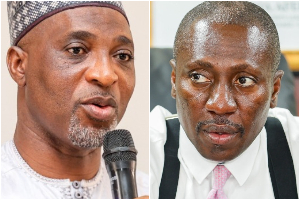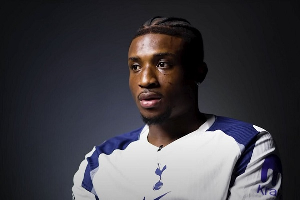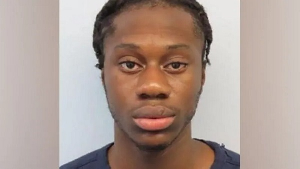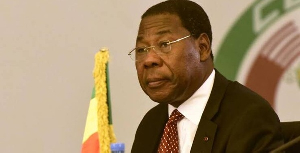Kofi Ata, Cambridge, UK
The presidential petition hearing at the Supreme Court (SC) entered its the final stages of evidence on Thursday May 30, 2013 with the entrance of the Electoral Commissioner, Dr Afari Gyan in the witness box on behalf of the second respondent, the Electoral Commission (EC). This is a review of his performance on his first day, though I normally do the assessment after cross examination. As usual the assessment is based on what I watched and listened to as I did not have the time for all the day's proceedings.
The day began with a minor drama or misunderstanding on the part of the lead counsel for the petitioners. For the second time, I actually watched the beginning live when Mr Addison asked for direction from the bench on Afari Gyan giving evidence without a sworn affidavit. Though this might have been surprising to many, lead counsel was entirely right to have even objected to him giving evidence without an affidavit as directed earlier by the court. However, what counsel might have forgotten was that, the court also directed that, only those directly involved in the petition or the petitioners and respondents could give oral evidence. This was a specific response to NDC’s earlier intention to call 7,000 witnesses. So, Afari Gyan being the head of the EC, the second respondent was allowed under the same directive to give oral evidence.
Though this is unfair to the petitioners in terms of the normal rules of disclosure and evidence, we should remember that this case is not the norm. If it was, such matters would have been dealt with by the lower courts (High or Appeal Court). Again, when it comes to the rules, the authority on the law rests in the bosom of the SC and they have the privilege of making their own rules. Those who misinterpreted Mr Addison's reaction to running away from Afari Gyan were completely wrong. He found himself between a rock and a hard surface and therefore it was entirely appropriate that he did not put in an objection but asked for direction from the bench. Let me put it on record that though the approach by the second respondent, EC (the failure of the key witness to come by affidavit) is unfair to the petitioners it could also be a handicap to the second respondent.
Dr Afari Gyan’s face beamed with smiles and his demeanour, cheeky in the witness box so far. He sounded confident, an authority in his area of work and churning out lots of figures. As I always say, giving evidence-in-chief is the easier bit because one is being led by one’s own counsel. The questions are often suggestive of how and what the answers should be. In most cases, counsel and witness might have practised the exercise over and over again in advance. The real hard work begins under cross examination, when hostile questions are put to the witness by the opponent’s counsel/s. My big question to Afari Gyan is, will he still be all smiles and cheeky in the witness box after Mr Addison has had his bite of the cherry with him?
The answer to this thousand and one question above can only be answered after the event or probably, after the Justices have given their final verdict. For example, when his counsel suggested to him that Dr. Bawumia in his evidence to the court had stated that only 3,196 people were registered as “Face Only” (FOs) verification, Dr. Afari-Gyan cheekily said: "I don't know where he got that figure from". Almost as if he was asking the court to treat that figure with contempt (from his demeanour) and revealed that nearly 80,000 voters were registered as FOs.
The key witness for the second respondent, Afari Gyan can pour scorn on the evidence of the second petitioners and key witness for the petitioners and churn out figures in support of his claims. He is at liberty to say whatever will be allowed by the bench but he should remember that, his words would not be simply accepted on their face value just because he is the Electoral Commissioner and the Returning Officer for the December 2012 Presidential Election. If that was the case, then there would be no petition hearing in the first place. The fact is that, the petitioners do not believe his figures and that is why they are in court.
How can Afari Gyan convince the bench to admit that what he says is nothing but the (gospel) truth without documentary evidence to support them? That is the danger the second respondent and its key witness will face during cross examination. The witness has so far not been led in evidence to provide any documentary evidence by way of exhibits to prove all the claims and figures he has provided in court. What will be his defence if he is challenged to produce the evidence to back up the figures and claims under cross examination? Without the documentary evidence before the court, they are hear say from Dr Afari Gyan and lead counsel for the petitioners have the right to ask the Justices to disregard his figures in his closing address or submission to the bench if the second respondent and the key witness are unable to provide the necessary documentary evidence in court.
Of course, one could also ask if Dr Bawumia has any documentary evidence to support his claim that only 3,196 voters were registered as FO only. In law, since it is Dr Afari Gyan who is challenging Bawumia’s numbers, the onus lies heavily on Afari Gyan to prove otherwise, though that does not mean that Bawumia would be given an automatic benefit of the doubt by the bench if Afari Gyan fails to provide documentary evidence to prove his assertion/s.
Another hurdle that lies in wait for the second respondent is that, even if the second respondent’s counsel willingly leads the witness to provide the documentary evidence to buttress his claims, they are at the mercy of lead counsel for petitioners and the bench as to whether such evidence should be admitted since the second respondent failed to abide by the SC’s earlier order for further and better particulars. Any such submission of exhibits will have to come by a formal application to the court which Mr Addison will have the right to object to and subject to the decision of the Justices, the exhibits may be admitted or rejected. Therefore the decision for Afari Gyan to mount the witness box without affidavit and the failure by the second respondent to file documentary evidence in advance is a very high risk strategy that could backfire on them.
It is such moment/s of very important exhibits being disallowed by the court that Afari Gyan’s smiles, confidence and almost contemptuous demeanour could disappear or even turn into something unforgettable that could come back to haunt him in the future, especially, if the petition is upheld. It could also put pressure on him and shake his confidence under cross examination and potentially make him vulnerable in the witness box. Counsel for the petitioners could take advantage of such a situation and compel him to make mistakes and discredit his evidence and integrity.
Dr Afari-Gyan has a lot of explanation to do on the numerous irregularities, errors and mistakes on the pinks sheets. Those he referred to as transposition errors. It is not good enough for him to attempt to find excuses by putting the blame at the door steps of untrained temporal electoral staff. The buck stops with him. In his own words, he has conducted and supervised a number of elections under the Fourth Republic. Why were they not trained and did the election budget not include training for temporal electoral staff? Was 2012 presidential election the first time that irregularities, mistakes and errors were made by untrained temporal electoral staff and if not, what action/s his organisation taken to address such irregularities, errors and mistakes that have potential to destabilise the country?
In my view, though it is true that there are no faultless elections, we should not accept the words of Dr Afari Gyan that it will be a miracle if the there were no mistakes. These mistakes were far too many and perhaps the real miracle is that Ghanaians are peaceful so the country has avoided conflict so far. Ghanaians, especially, voters and tax payers have a right to an explanation from Afari Gyan why the numerous irregularities, errors and mistakes. They may be genuinely unavoidable but so far, I am yet to be persuaded, though I am not the one to be persuaded but the Justices and the petitioners.
In conclusion, though Dr Afari Gyan sounds convincing, confident and well versed in the issues he is giving evidence on, he is not a saint and I for one cannot take his words as sacrosanct for all the figures he has given without the documentary evidence to prove beyond reasonable doubt. I am sure lead counsel for the petitioners will challenge him on these matters under cross examination and demand physical proof. In such circumstances, he could be found wanting if he is unable to provide the evidence to support them or such evidence is rejected because he did not tender them in advance as ordered by the court.
So far, he is done very well with his presentation in the witness box, especially in demystifying “biometric verification”. Until his confirmation that there are two forms of biometric verification, some, if not many, have been made to believe that biometric verification only meant finger print verification. His confirmation also opens another door to the argument on whether votes without biometric verification should be annulled. That is, if such voters were verified by “Face Only” verification, should they be annulled?
This case is not over yet until it is truly over. In the mean time, Dr Afari Gyan can smile in the witness box but who will have the last laugh is entirely in the hands of the nine Justices. We will bear witness to how he fares in the witness box next week and under cross examination. We cannot wait to do the post-mortem.
Kofi Ata, Cambridge, UK
Opinions of Sunday, 2 June 2013
Columnist: Ata, Kofi














